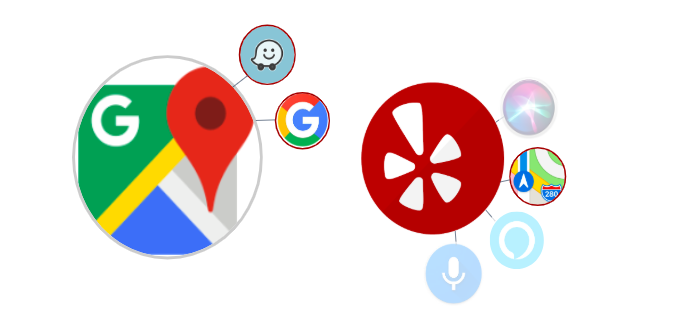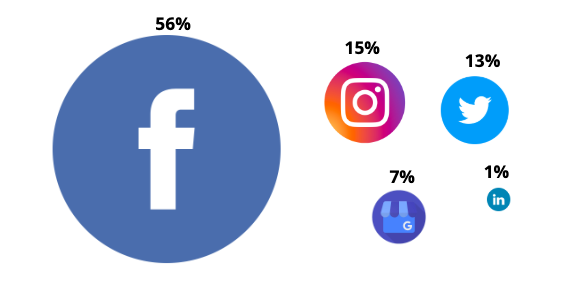We recently attended The Multifamily Social Media Summit, which is the only event specifically developed for property management firms leveraging social media and content marketing to retain and attract new residents. Our CEO, Afif Khoury, presented a keynote entitled, “Top Social Media Trends of 2020 and Leveraging Them for Multifamily Businesses.” Although the event required tickets, don’t despair. We’ve got your top takeaways from Afif’s keynote below:
The Changing Consumer Journey
With digital technology evolving, so is the consumer journey. Today’s consumer journey includes many touchpoints, and as a marketer, you need to be present at any point along that journey.
The first major change is that the journey has become local. When consumers are making purchase decisions or when they’re looking for business information, many times, that experience is local. Also, the consumer journey is no longer a direct path, and not every consumer journey is the same. There are so many different paths that a consumer can take, and the consumer can start or end the new journey at any point.
These are some key considerations that marketers need to know – your goal as a marketer should be to Identify the changes to more effectively meet and engage customers on their journeys.
The Top Localized Social Media Trends of 2020
All of the following trends are impacting where marketers need to be present in that consumer journey, and how a multi-family business can use these as an opportunity to reach potential residents.
1. The Changing Landscape of Local Search
Most business searches start with a local search, but what a lot of marketers might not know is where the search is executed has changed. Five years ago, consumers would conduct a search on a search engine, click through websites on the search engine results page (SERP), and finish their conversions.
Although consumers haven’t changed their search behavior drastically, the results that they receive have. Consumers are still going to a search engine to conduct a search, and look for business information, but oftentimes the top results are localized and appear before any organic website results. And when consumers click, the link takes them to a local page that is hosted by the search platform or the social site, not the business’s website. Because those local pages are giving consumers the content they need to convert, they’re not leaving and clicking to other sites. As a result, those local listings, or one box listings, on Google have become a necessary component for any multi-family marketer’s digital marketing strategy.
What drives local search presence?
Web activity has shifted – the share has moved to one box listings versus organic search results. So, what can your multi-family business do to be present? Search presence comes down to authority, expertise, and trust, which all contribute to the local search results ranking. The factors vary by industry. Restaurants may look at expertise more than trust, while home services might weigh heavier on trust than expertise. Here are the details of each category:
Authority
Authority used to be dependent on your business having its information on a number of different websites, and those sites built citations back to your site. The higher your authority, the higher your presence. Authority is yet another part of local search that is changing. The big authoritative sites are now platforms like Google My Business (GMB), Yelp, or Facebook, and they have become more reliable than the traditional business directories, which used to drive the authority to your website.
Your multi-family business must build authority through having your local business information validated on the big three platforms – GMB, Facebook, and Yelp.
Expertise
Expertise is built through local content and posts. The copy needs to be rich in keywords to build your expertise in those areas. Reviews on GMB and other third-party review sites are less impactful from an expertise-standpoint; however, they can also have keywords that show your expertise.
Trust
Trust is built through local ratings and reviews on GMB, Facebook, and Yelp, and are driven by consumers.
Zero-click search
And as Afif covered earlier in the presentation, searches are providing local results with one box listings, and the conversion is happening through those results. This concept is being defined as Zero-Click Search; meaning, consumers are landing on these rich local pages, showing authority, expertise and trust, and they’re converting on the local page.
Zero-click affects about 61 percent of general searches. And when you look at the property/real estate industry, we still see 45 percent of searches as zero-click – that’s almost half of your searches executing on local pages! Knowing how impactful this trend is, how can you prepare your multi-family business?
- Manage and maintain your local search listings and pages
- Ensure each local profile page is complete with business descriptions, keywords, hours of operation, photos, etc.
- Manage your local reviews – volume, average rating, and response time
2. Map and Navigation Searches
Searches in search engines are still huge, but with the growing usage of mobile devices, searches natively on maps and navigation apps have increased over the past two years. In certain industries, real estate/property management being one of them, we see a lot of search activity in maps & navigation. From a general search standpoint, there are 3:1 maps to search impressions.
There are 4:1 map impressions to search impressions for property management.
How can you prepare your multi-family business for this growing trend of maps and navigation app searches? The top 3 maps and navigation sites reach over 90 percent of users – Google Maps (67 percent), Waze (12 percent), and Apple Maps (11 percent). Claiming your local listings and pages are on GMB and Yelp ensures you are covered on all three of the maps and navigation apps!
- Google Maps results fed through GMB
- Waze is fed through GMB
- Apple Maps is fed through Yelp
3. Social Content is Changing its Form
Social content is also evolving. We’re all familiar with the popular social sites; however, here are the most popular sites for engagement with multi-family companies:
When a consumer is looking to engage with a company it is different versus just personal use and engaging with friends. The type of content that they’re consuming is changing as well. The new content destination is Stories.
Stories
Here is the data to back up that claim:
- Story-based sharing is growing 15Xs faster than newsfeed sharing
- 1 billion users across Facebook, Instagram, Snapchat, and Whatsapp prefer the Stories format
- 69 percent of users say Stories are a great way to discover new products/services
Stories are important to incorporate into your multi-family business strategy; however, newsfeed content is still important. What is the difference between the two?
- Newsfeed: Ideal for reach, sound is not used, content planned and curated, and it represents your brand
- Stories: Ideal for engagement, the sound is on, in-the-moment content, more casual place to check into your brand, and vertically oriented
Now, how can you prepare stories content for your multi-family business?
- Test stories by using some of your existing photos and video content and add text, stickers, change the filter, etc.
- Start incorporating stories as part of your content around key events at your properties
- Once comfortable, build a stories strategy as part of your overall social media plan
- To increase your reach, test sponsored stories and implement the stories highlight feature on your profile
4. Social Conversations – Community-Based Q&A
In consumer product searches, ratings and reviews are still huge, but Q&A is growing. Amazon is a great example of this, and they have been doing it for years. Welcome to the new world of social conversations – a form of “interactive reviews,” and the best use case in the property management industry is Google Q&A. Here is an overview of Google Q&A:
- Launched at the end of 2017 in stealth
- Found in the “Overview” tab of your GMB Page
- On average there are two questions posted per business location
- 50 percent of these questions have been found to be customer service-related and if left unanswered can affect the reputation of your business
- Of the questions posted – only one out of three are responded to on average for multi-family businesses
- Over 60 percent of these responses are from “Local Guides” and/or the community versus the business owner themselves
Consumers are looking at reviews to build trust, but they are also diving into consumer Q&A with the same intent. Q&A is starting to become a new type of social conversation for property management; how should you prepare?
- Go into your local profiles and answer the questions that are outstanding
- Use technology or assign someone on your team to check for new Q&A additions at least once per week
- Post the most frequently asked questions on your profiles, then answer these as “The Business Owner”
5. Converting Social Engagements to Actions: How Messenger + AI-Based Chatbots Can Change the Social Landscape
The way that we communicate in social is also changing. We know that social platforms are built to have these conversations – as a consumer, you write a post and expect someone to respond. And over the last few years, consumers are becoming more impatient. The need to get immediate responses is increasing, and as a result, they are turning to Messenger.
Messenger and Chatbots
Messenger and AI chatbots can launch conversations, and it’s all about converting social engagements to actions. Here are the stats:
- 87 percent of the global smartphone population messages
- 64 percent of people would choose messages over picking up the phone or sending an email
- 67 percent prefer using a messaging app to interact with businesses around the world
- 1.3 billion people use Messenger each month
- 30 million active businesses on Messenger
- 20 billion messages sent between people & businesses each month
Messenger drives personal connections
Multi-location businesses tend to not know how Messenger applies to them. Through Messenger, you’re able to follow-up and continue engagement with residents. By harnessing the power of bots, you can drive sales, book appointments, get contact information, and schedule visits. How can you get started? By having a local Facebook Business page, you are already on Messenger, and you can leverage Facebook Business Manager to set up an auto-response to resident inquiries, however, those options are quite limited.
Coming soon – SOCi will be able to help you stimulate your conversations on Messenger with Chatbots at scale. Stay tuned for future product updates on this release! And if you want to see where we’re speaking next, head to our events page to see where we’ll be!

